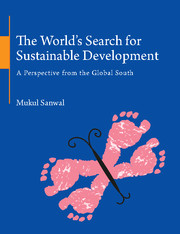Book contents
- Frontmatter
- Dedication
- Contents
- Preface
- Acknowledgments
- Abbreviations
- INTRODUCTION
- 1 Social Dimension of Sustainability
- CONSUMPTION IN AN UNEQUAL WORLD: FRAMING INTERNATIONAL COOPERATION
- CLIMATE POLICY: GLOBAL TO NATIONAL
- 6 Political Origins of Climate Policy
- 7 Questions on the Framework
- 8 Burden Shifting Rather than Burden Sharing
- 9 Development of a Shared Vision
- 10 The Middle Class and Global Ecological Limits
- 11 The New Climate Regime
- SUSTAINABLE DEVELOPMENT: NATIONAL TO GLOBAL
- CONSUMPTION IN A MORE EQUAL WORLD: SHAPING SOCIETAL FUNCTIONS
- GEOPOLITICS TO GEOECONOMICS: RURAL–URBAN DIVIDE, RATHER THAN BETWEEN COUNTRIES
- THE ASIAN CENTURY
- Index
10 - The Middle Class and Global Ecological Limits
from CLIMATE POLICY: GLOBAL TO NATIONAL
Published online by Cambridge University Press: 18 December 2015
- Frontmatter
- Dedication
- Contents
- Preface
- Acknowledgments
- Abbreviations
- INTRODUCTION
- 1 Social Dimension of Sustainability
- CONSUMPTION IN AN UNEQUAL WORLD: FRAMING INTERNATIONAL COOPERATION
- CLIMATE POLICY: GLOBAL TO NATIONAL
- 6 Political Origins of Climate Policy
- 7 Questions on the Framework
- 8 Burden Shifting Rather than Burden Sharing
- 9 Development of a Shared Vision
- 10 The Middle Class and Global Ecological Limits
- 11 The New Climate Regime
- SUSTAINABLE DEVELOPMENT: NATIONAL TO GLOBAL
- CONSUMPTION IN A MORE EQUAL WORLD: SHAPING SOCIETAL FUNCTIONS
- GEOPOLITICS TO GEOECONOMICS: RURAL–URBAN DIVIDE, RATHER THAN BETWEEN COUNTRIES
- THE ASIAN CENTURY
- Index
Summary
Carbon budget, societal transformation and urbanization
New data, based on national communications, released by the United Nations shows that emissions from the United States increased over 15 per cent in the period 1990–2008 and will increase another 7 per cent by 2020 [UNFCCC, 2011]. Recent research in the United States assumes that 200 Gt of carbon dioxide equivalent will be available in the period 2012–2050; while for 2008, annual emissions from the United States were 7 Gt. The scientific analysis is unambiguous, and notes that this budget is ‘based on “global least cost” economic efficiency criteria for allocating global emissions among countries, and using other criteria, different budget numbers could be suggested, for instance, some argue that based on global “fairness” concerns, a more aggressive U.S. emission reduction effort is warranted’ [NAS, 2010]. A climate budget framework provides a sound basis for global and domestic policy.
After Copenhagen, with agreed limits on increase in global temperature, global policy requires early agreement at the multilateral level on quantitative limits on emissions and allocation criteria for the scarce atmospheric resource. The IPCC has also shifted its emphasis to the remaining global carbon budget, because scientifically for an agreed temperature limit, the carbon budget is a more appropriate framework. However, the industrialized countries, having failed at Copenhagen to secure a partitioning of the atmosphere are now against a legally binding regime that would impose restrictions on them, signifying an end to the global climate policy enunciated in 1992.
Developing countries recognize that the context in which sustainability is being discussed at the multilateral level has changed since the Rio Conference and negotiation of the Climate Convention, in 1992. In 2005, developing countries accounted for more than half of global GDP at purchasing–power–parity (PPP), their prospects for economic growth enables them to devise national strategies for development of infrastructure necessary for eradication of poverty that will also move to a low-carbon middle-class economy and society, blurring the way emissions are characterized as ‘industrial’ emissions with a focus on production factors, while ignoring urban consumption.
Consumption, and not only production, is now being seen as a determinant of sustainable development.
- Type
- Chapter
- Information
- The World's Search for Sustainable DevelopmentA Perspective from the Global South, pp. 147 - 153Publisher: Cambridge University PressPrint publication year: 2015

